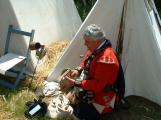16
British soldier re-enactors from the Acadian Deportation period18th Century, Circa 1755
Remsheg, one of 19 ways to spell the Mi'kmaq name for the village in Nova Scotia now Wallace
 Credits:
Credits:David Dewar
17
Most of the information about the Deportation of Acadians from the Northumberland area of Nova Scotia, Tatamagouche and Remsheg, comes from a diary by Captain Abijah Willard.Willard was born in Lancaster, Massachusetts and joined in the 1745 seige of Louisbourg as Captain in the 4th Massachusetts Regiment, commanded by his father.
Ten years later he was Captain in Governor Shirley's provincial regiment at the seige of Fort Beausejour in June, 1755.
His diary is an almost daily posting of events from traveling to Nova Scotia in May 1755, through the attack on Fort Beausejour and the following months leading to the deporting of the Acadian people.
The capture and burning at Wallace in Willard's words (as he had written it, only a few changes in spelling to make it readable):
"August 15th, 1755.
This morning all the French came according to orders yesterday by nine o'clock, looked very cheerful to hear what I had to say to them by my orders from Colonel Monckton.
Upon their arrival I sent Captain Lewis and Ensign Willard with 40 men to a place 12 miles from this place. Captain Lewis with 20 men to go by canoe and Ensign Willard by land with the others to a place called Ramshak (Remsheg, or "Wallace") with two of the French as pilots. They marched about 10 this morning. After this party was gone I ordered the Sergeant to see all the men Drawed up in a body and marched to the house where the French were and then searched every house in ye place for their arms and found sum fine guns and then went to the house after setting sentries rond the house and told them that they must go with me to Fort Cumberland and burn all their buildings which made them look very sober and dejected. One of the French asked me for what reason? for he said he had never taken up arms against the English since the fight at Minas and since swore by the Bible that he never would: before Maj. Phillips of Anoplis; and he was ready to swear now and all the rest made the same reply; after this I told them they were rebbelious. The french man askt me in what , I answered him in harbouring Indians from Saint John's Island (Prince Edward Island) to go to New England and novascotia and finde them provisions and ammunition which they answered and said they were obliged to or the Indians would kill them. I told them if they had been true they might have been protected by the english and i told them they might carry their families with them if they tought best and upon which they ast me to have the liberty to go with their families to the Island of St Johns but soon an; answered them, It did not fall in my power to do it and they askt me liberty for two hours to consut wether they thought best to carry their families, I granted them the liberty and after they had consulted with each other they nent for me and made this reply that they had chose to leave their families which I readily granted for I did not want the trouble of the women and children
Beer was given this day in lew of Rum.
"August 16, 1755
This day Captain Lewis and Ensign Willard returned with the party from Ramshack with 3 families and burnt several houses. About 12 oclock upon their return I went with a small party of men over alarge river Tatamagouche where I burnt 12 buildings one of which was a storehouse with Rum and molasas and Iron ware and another of rum sugar, molasas and wine and a masshouse. I ordered the men to draw as much Rum as they had bottles to carry with they did and set fire to the rest, burnt all their vessels and cannoos...."